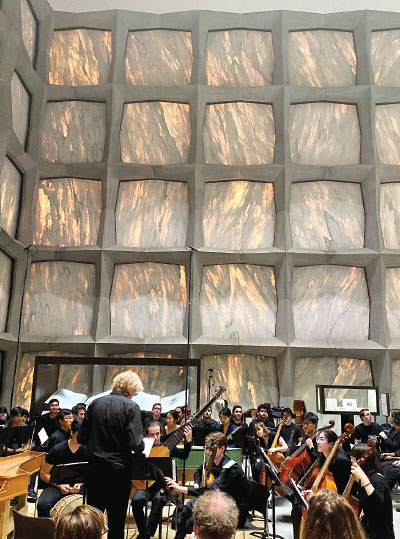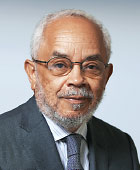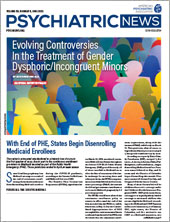It was a good day, one of those featuring a pleasant spring temperature and a sky that was boastfully blue. Since my destination was only about a mile away, I decided to take what my father used to call an afternoon constitutional (defined in his 30-year-old American Heritage Dictionary as a walk taken for one’s health) and daydream on the way. Young undergraduates moved swiftly around me, engaged in their own pressing business. When I turned a corner to reach the Yale Beinecke Rare Book and Manuscript Library, there were more students seated casually at occasional tables, deep into their computers and ignoring passersby. The peace and quiet made the daffodils and tulips stand out. Everybody seemed to appreciate the privilege of enjoying lethargy and calm. I had two thoughts. I wondered about the money and effort taken to create and maintain a campus space so conducive to feeling at ease. Then I recognized the contrast with the reports and debates on daily television.
The Beinecke Library houses a large collection dedicated to rare books and manuscripts and serves as a repository of literary archives. Examples of its holdings are the Gutenberg Bible that dates to 1454 and a 1,250-year-old print of Buddhist prayers from Japan. The library was opened in October 1963 and has steadily become a special place within the university. This is not just because of its holdings, the exquisite courtyard, and its outstanding architecture (like its one-and-a-quarter-inch thick “windows” made of translucent Vermont marble panels that protect the collections from sunlight). The library has earned a reputation for its programs of concerts, readings, and conferences that are diverse and attract students, faculty, and the public. It is easy to see how the Beinecke defines and extends the mission of a university, promoting community unity and quietly enhancing mutual pursuit of intellectual curiosity.
I had set out from home on that recent afternoon to be in the audience at the Beinecke for the Yale Collegium Musicum’s performance of music from Renaissance Italy. Another look into my father’s dictionary informed me that collegium refers to “a group, the members of which pursue shared goals while working within a framework of mutual trust and respect.” The Yale Collegium, featuring both singers and instrumentalists, reportedly gave its first concert in 1943. Its mission was apparently defined as the performance of music from the 12th through the 18th centuries. Not being an aficionado of Italian Renaissance music, I think I was drawn to the concert because of the performance venue and my love of singing. The event also represented a cultural happening, open to the community and free of charge.
A preconcert presentation and Rebecca Arkenberg’s article, “
Music in the Renaissance” (posted on the Metropolitan Museum of Art’s website), pointed out that Italian Renaissance music was played in the 15th and 16th centuries. Polyphony, the singing of multiple lines of music at the same time, had become fashionable. Two major forms of polyphony developed. Motets were composed using texts from religious sources, and the madrigal employed excerpts from secular sources like poems.
The concert I attended began with a “lauda,” described in the program as a devotional song composed “to be sung by lay people outside of the official liturgy of the Catholic mass.” There was also a four-part madrigal composed by Philippe Verdolot, one of the famous composers of the genre. That piece was in sharp contrast to the “lamentation” (a plaintive composition for a single voice) composed by Claudio Monteverdi. That obviously mournful work was based on a text, “So sweet is the torment that resides in my breast, that I live content ... at the gates of heaven.” “The Triumph of Love,” composed by Giaches de Vert, another madrigal expert, was performed before the program transitioned to popular tunes, which, to my ear, sounded more rhythmic and danceable.
About 50 singers and instrumentalists performed with sensitivity and a structured delicacy. The music felt familiar to me, I suspect, because of contact with English composers like William Byrd and the chorales of the period from other parts of Europe.
This genre of experience never fails to make me contemplate my own pathway to a university life. I knew instinctively that I could not have attended a concert like this one in 1950s Barbados, especially in a building of such intentional magnificence. I enjoyed thinking back to the instruments I encountered in my childhood: the occasional violin, the guitar for folk music, and the ubiquitous church organ. Then once I migrated to the United States, I met an Italian youngster who played classical guitar. At this Beinecke concert, I was introduced to the theorbo, dulcian, and sackbut. What a revelation!
I could not help moving from this performance of Italian Renaissance music in a beautiful university space to the persistent contentious noise about equitable access to these distinguished precincts. Watching the young people singing this music and playing these instruments with such passion and vigor was, to use their own patois, awesome. They could see the breadth of what was possible for them in their universe. The obligation, then, must be to reinforce the commitment to equitable access for youth to these spaces. ■


